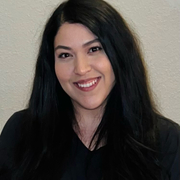
Understanding the Impacts of Trauma on Eating Disorders
Please use the self-sign-up link and code "Academy2025" to create an account on our CE Portal. If this is your first time accessing our portal, you will receive a confirmation email from ERC and Pathlight Continuing Education Events with a link to log in. If you have an existing account, once you’ve completed the self-sign-up form, you can log directly into your account to access the webinar.
Download our instructional PDF.
Presented by

Landry Weatherston-Yarborough, LPC, CEDS-S, NCC (she/her/hers)

Kris Ramos, LCSW-S, CEDS-C (she/they)
In this presentation we will be exploring trauma and the impacts of trauma on eating disorders, specifically in the child and adolescent Latinx population. Traumatic experiences and eating disorders can both severely impact human functioning. Discussion will include how to approach trauma and eating disorder care for the best possible outcomes, including clinical perspectives and lived experience.
Educational Objectives:
Following this presentation, participants will be able to…
- Define trauma and identify common presentation
- Describe the connection between early childhood trauma and eating disorder pathology in children and adolescents
- Explain the screening process and common treatment modalities for trauma and eating disorders
Available Continuing Education Credit
In support of improving patient care, Eating Recovery Center and Pathlight Mood & Anxiety Center is jointly accredited by the Accreditation Council for Continuing Medical Education (ACCME), the Accreditation Council for Pharmacy Education (ACPE), and the American Nurses Credentialing Center (ANCC), to provide continuing education for the healthcare team.
As a Jointly Accredited Organization, Eating Recovery Center and Pathlight Mood & Anxiety Center is approved to offer social work continuing education by the Association of Social Work Boards (ASWB) Approved Continuing Education (ACE) program. Organizations, not individual courses, are approved under this program. Regulatory boards are the final authority on courses accepted for continuing education credit. Social workers completing this course receive 1.5 clinical continuing education credits.
Completion of this RD/DTR profession-specific or IPCE awards CPEUs (1.5 IPCE credit + 1.5 CPEU). If the activity is dietetics-related but not targeted to RDs or DTRs, CPEUs may be claimed which commensurate with participation in contact hours (One 60-minute hour = 1 CPEU). RDs and DTRs are to select activity type 102 in their Activity Log. Sphere and Competency selection is at the learner’s discretion.
Eating Recovery Center, LLC is approved by NBCC as an Approved Continuing Education Provider, ACEP No. 6815 Programs that do not qualify for NBCC credit are clearly identified. Eating Recovery Center is solely responsible for all aspects of the programs.
Eating Recovery Center, LLC is approved by the American Psychological Association to sponsor continuing education for psychologists. Eating Recovery Center maintains responsibility for this program and its content.
Eating Recovery Center, LLC is recognized by the New York State Education Department's State Board for Psychology as an approved provider of continuing education for licensed psychologists #PSY-0232.
Eating Recovery Center, LLC is recognized by the New York State Education Department's State Board for Mental Health Practitioners as an approved provider of continuing education for licensed mental health counselors. #MHC-0280.
Eating Recovery Center, LLC is recognized by the New York State Education Department's State Board for Social Work as an approved provider of continuing education for licensed social workers #SW-0756.
All Eating Recovery Center, LLC sponsored educational activities are presented in compliance with the Americans with Disabilities Act (ADA). If you are in need of accommodations, please contact Wendy Foulds Mathes at [email protected].
